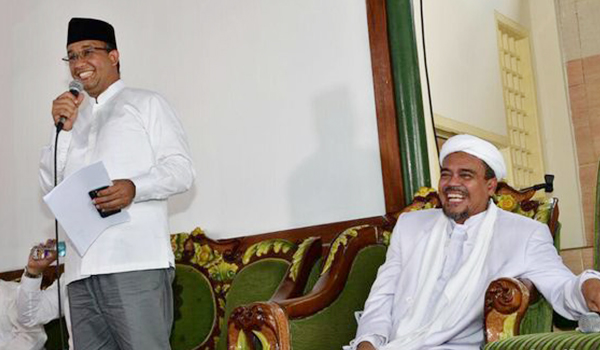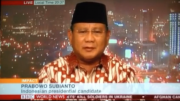Just a few weeks ago, I wrote a generally rather up-beat assessment of Indonesia’s prospects. The gist of it was that Indonesians have more common sense than the cliques who have traditionally led them. This, combined with the country’s decentralised micro-democracy, allows for the emergence of new types of leaders, women and men who may break the stranglehold of the handful of dynastic interest groups which have wielded power for seven decades. To which a friend whose opinion I respect countered: “Your piece came across as sugarcoating what I think is a continued backsliding or worse… I’m not an alarmist either, nor particularly a pessimist, but the entire tone of your piece seemed completely removed from the reality of Indonesia right now.”
Ouch. What hurts most, of course, is that virtually everything that has happened since I wrote the piece suggests that my friend’s criticism was well-founded. Though I was unexpectedly granted my Christmas wish for 2016 (no church bombings in Indonesia over the holidays), all else suggests that I overestimated both the common sense and, especially, the potential for it to support a new type of leader. Exhibit A: former Minister of Education Anies Baswedan.
I’m an admirer of Indonesia Mengajar, a programme Bpk Anies copied from Teach For America, which sends graduates from the nation’s best universities to teach in neglected primary schools. I wrote about his impressive speech at the Frankfurt Book Fair, upholding the values that make Indonesia special:
Referring directly to the hundreds of thousands of refugees from different cultural traditions who are besieging the borders of Europe, he spoke of what the world might learn from Indonesia: that diversity is a source of strength, not of weakness. Indonesia, he said, specialises in managing differences.
In the interests of strengthening his bid for Governor of Jakarta, Anies went and grovelled to the FPI, a group of Islamic-themed thugs until recently more specialised in running protection rackets than in mainstream politics. (That’s FPI leader Habib Rizieq sharing a merry moment with Anies.) The group is for now more interested in money than in the mechanisms of public policy (and can thus doubtless be bought off for better or for worse). But profane interests are these days to be no obstacle to taking centre stage politically…
During his visit to kowtow to FPI, Anies explicitly renounced “liberal” Islam, and tried to polish up his homophobic credentials by reminding his audience that he had tried to close down gay-themed lectures at the university where he was rector. This was disappointing to many young Indonesians who looked to him as a beacon of pluralism. It also disappointed those, like me, who hoped that a new breed of politician might succeed by appealing to the common-sense electorate, rather than to power broker groups and their puppeteers. A politician such as Ahok, for example.
But wait, there’s worse. It seems that sycophantic toadying is the order of the day in Indonesia not just in politics but in other domains, too. There’s a storm brewing in the Australian press’s tea-cup over apparently “insulting” materials found at an Australian military training facility. These include a characterisation of the state philosophy Pancasila (the Five Principles) as Pancagila (the Five Madnesses). Like a sulky child insulted in the playground, Indonesia’s military has said “I’m not playing with you any more” and has pulled out of joint training exercises. Odd, isn’t it, that TNI did not squeak when the FPI leader Habib Rizieq launched the same insult six months ago.

A thin-skinned military is a national embarrassment and quite possibly a danger, but not that much of a surprise. (Boys are like that.) But wait, there’s even worse.
Of all the things that most proved my critical friend right in the last couple of days was the news that Finance Minister Sri Mulyani, the cabinet minister I respect most by a wide margin, has kicked JP Morgan bank out for saying unflattering (but almost certainly true) things about Indonesia’s economic prospects.
“We don’t close ourselves to assessment because it’s important for us to improve ourselves,” Finance Minister Sri Mulyani said. “But the institutions with big names have very high responsibility in creating positive psychology instead of doing [something] misleading.”
It seems that even Indonesia’s most thoughtful technocrats are happier with the type of pie-in-the-sky, give-us-the-business sycophancy that made such a laughing stock of consultants McKinsey in 2012. Their “Unleashing Indonesia’s Potential” report — an object lesson in creating “positive psychology” as well as in self-interested brown-nosing — was published shortly before the rupiah dived by 40%.
Indonesia’s head-in-the-sand approach seems to be part of a global zeitgeist. Just hours after Indonesia sent JP Morgan packing for telling the truth, the UK’s ambassador to Brussels resigned, apparently because politicians in London don’t want to hear about the terrible mess they have led the nation into. “Speak truth to power,” Ivan Rogers urged the colleagues he left behind. But it seems like neither voters nor the Powers That Be want to hear any truth these days.
For my part, I’m happy to hear from (reasoned) critics. Perhaps they will help me better to understand the reality of Indonesia right now.








Hi Elizabeth,
I fully agree with your assesment on FPI. In many occasions, FPI showed their insult on Pancasila. However the image you used for this, in my opinion, doesn’t depict insult – instead it implies tthat FPI is pro-Pancasila.
Not sure about the military thing. I’d suspect the real reason for this will remain undisclosed officially.
On the JP Morgan, it is more than just about research issue. The real action from JPM on the background is the main issue and this is not the first time for JPM for making this mistake. On the content of research, it is highly debatable. Truth is a relative thing, especially for nowadays.
Hi Elizabeth,
It seems to me that there is a rise in “inward lookingness” happening. Call it Nationalism if you like but it manifests itself by rejecting the outside world and not accepting any input from that world. This has been happening for quite some time and appears in many different ways.
Forcing miners to process their materials within Indonesia is one example.
Another is the regulation stipulating that all Indonesian citizens must do the national exams regardless of what curriculum they might be studying, even where what they are studying does not fit with UNAS.
It might also be evident in the way Neil Bantleman and Ferdinant Tjong were tried and convicted on obviously spurious evidence. In that case, the Singaporean court’s judgement on the mother’s allegations was ultimately rejected, even though it was based on common sense and proper scientific evidence.
Then there’s the attempt to traduce the evidence of the Australian forensic specialist in the cyanide poisoning case by expelling him from Indonesia.
Finally, see also the increasing difficulty of getting KITAS and work permits through the bureaucracy, which could well be interpreted as an attempt to keep the outside world out.
Unfortunately, the one area where I would support such an attitude is the increasing influence of Saudi Arabia, but that’s another story.
It’s sad because I don’t believe the majority of Indonesians would support this.
Anies is the worst. I used to admired him too, until an acquaintance pointed out a fact that Indonesia Mengajar was sponsored by Petro’s owner while Anies served as Petro independent commissioner. Independent commissioner’s job is to protect minority investors and, thus, could not be someone who has any kind of relations with majority investor. It’s such a brazen breach of responsibility.
Nobody complained obviously. A complex ethical matter is not our best feat. Yet, if you really think about it, isn’t it weird that a person who consider himself as highly ethical could do the most unethical thing about his job? Now, based on that certain speech, turned out he’s also been posing as a moderate (and enjoy the benefits of being perceived as one) all the while doing his best to suppress pluralism in Paramadina, isn’t him?
Anies is weird, but please don’t hold it against us.
Remembering what JKW said today about each country should stay out of each other’s internal business, more likely is the “West Papua Independence” essay the Australian Officer submitted that cause the whole kerfuffle. Regardless of how you feel about the whole West Papua issue (because Australia is such an exemplar when it comes to “dealing” with Melanesian people) it is serious business on our end
For JP Morgan, I was with you until I know today that they’re the one responsible for trading Indonesian Bond, so Conflict of Interest ahoy.
They’re not just some strategist seeing and writing from afar
I do agree about the conflict of interest. But that problem is ingrained in the whole of the investment banking system; it’s not peculiar to JP Morgan. JP Morgan’s downgrade was on Indonesian equities, not the bonds which the bank is appointed by Indonesia to sell. Is Indonesia really saying that not one of the thousands of employees who works for a bank appointed to sell Indonesian bonds may provide their clients with realistic analysis of any aspect of the Indonesian economic landscape?
Indonesia’s thuggish image begins at the point of entry. Her immigration officers are vile, foul-mouthed yobs who should realise that there is a way to speak to foreign visitors and workers entering and leaving. A friend of mine witnessed a Japanese visitor being openly, verbally assaulted and having his passport thrown at him as the immigration officer shouted “and do not come back..” After responding to this, the Japanese man was then apprehended by the officer and taken into a nearby room, leaving the watching queues of people aghast and disgusted..
Jakarta’s Governor Gave Indonesian Islamists an Opening
Basuki Tjahaja Purnama alienated the public with forced evictions along with a crude and abrasive style.
http://www.wsj.com/articles/jakartas-governor-gave-indonesian-islamists-an-opening-1478711870
All around the world thugs and sycophants are on the rise, no?
What connects these phenomena? Articles at Project Syndicate points to the right direction, I think.
Yours is like missing tree for the forest.
No doubt all the ‘trees’ that you mention is visible, but where’s the ‘forest’?
Indonesia is not becoming but always and is a country where the thugs rule. Preman is a culture in Indonesia as well as jawara, centeng and jagoan. The name is a lot but the practice always the same. The people of Indonesia believe orang sakti. They rule even if they are evil because common people afraid of their supernatural ability. Most of those local ruler by their ability to scare many common people with their supposely extraordinary ability.And I believe you know how much Soeharto and Soekarno also feared and awed as many Indonesians believe of their ‘kesaktian’.